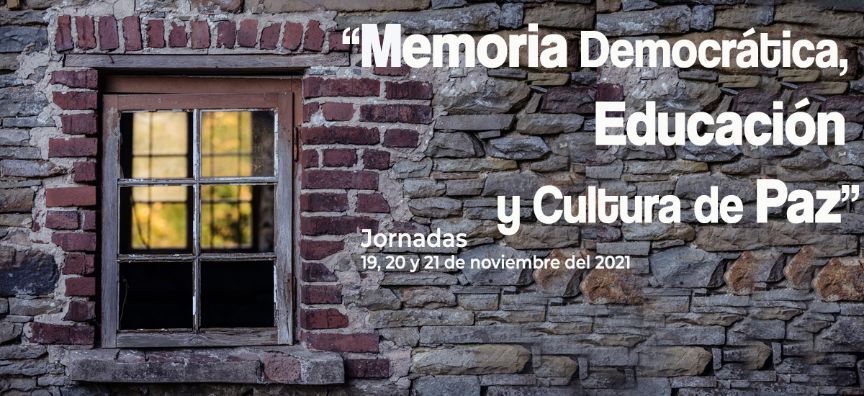- The State Secretary of Democratic Memory organizes a convention to discuss education and culture of peace in the framework of the debates of the new law of democratic memory in Spain;
- The event will take place from November 19 to 21 at the Circle of Fine Arts in Madrid and will gather representatives of memory associations, academics and policymakers;
- The president of AMESDE and coordinator of the convention, Jaime Ruiz Reig, will deliver the opening session together with the State Secretary for Education, Alejandro Tiana Ferrer, and the State Secretary for Democratic Memory, Fernando Martínez López;
- The EUROM will be in charge of presenting the European framework for memory and remembrance.
Background
Since the end of the Spanish civil war and the world conflicts that devastated Europe in the 20th century, and especially since the Holocaust, the promotion of democratic memory policies has become a moral duty that is essential to strengthening societies in order to neutralize oblivion and avoid the repetition of the most tragic episodes in history. A strong commitment to ‘never again’ pedagogy has become a fundamental ethical imperative in democratic societies around the world. Memory processes are an essential component of the configuration and development of all human societies and affect from the most everyday gestures to major State policies.
The unfolding of memory is especially important in the constitution of individual and collective identities. Its enormous potential for cohesion is comparable to its capacity to generate exclusion, difference, and confrontation. For this reason, the main responsibility of the State in the development of democratic memory policies is to promote its restorative, inclusive and plural aspect. To this end, public policies of democratic memory must collect and channel the aspirations of civil society, encourage citizen participation and social reflection, and repair and recognize the dignity of the victims of all forms of intolerant and fanatic violence. Memory thus becomes a decisive element in promoting open, inclusive, and plural forms of citizenship, fully aware of its own history, capable of detecting and deactivating the totalitarian or anti-democratic drifts that grow within it.
The Spanish Constitution ensures, within the framework of the right to education, the full development of the human personality in respect of fundamental rights and freedoms and the democratic principles of coexistence and this must be built from a critical attitude and the right to know the truth.

AGENDA
November 19
5,00 pm
- Presentation
Jaime Ruiz Reig, coordinator of the convention and president of AMESDE and PCV
- Opening
Alejandro Tiana Ferrer. Secretary of State for Education
Fernando Martínez López. Secretary of State for Democratic Memory
6,00 pm
- Opening speech
Pablo de Greiff. Former United Nations rapporteur for the promotion of the principles of truth, justice, reparation, and guarantees of non-repetition (telematic intervention)
6,30 pm
- “The duty of memory”. Reyes Mate. Philosopher and researcher at the CSIC
7,00 pm
- “History and democratic memory”
Coordination: Mirta Núñez Díaz-Balart. Professor of History of Social Communication at the Complutense University of Madrid (UCM) and Vice President of AMESDE
-
- Carme Molinero i Ruiz. Professor of History. Autonomous University of Barcelona
- Fernando Hernández Sánchez. Professor of Contemporary History. Autonomous University of Madrid (UAM)
- Leoncio López-Ocón Cabrera. Researcher at the CSIC
November 20
10,00 am
- “International Humanitarian Law and Restorative Justice”
Coordination: Araceli Manjón-Cabeza Olmeda. Professor of Criminal Law. Complutense University of Madrid (UCM)
-
- Baltasar Garzón. Lawyer and professor at FIBGAR.
- Carlos Jiménez Villarejo. Lawyer and Anti-Corruption Prosecutor
- Almudena Bernabéu García. Lawyer and director of Guernica37 International Justice Chambers
12,00 pm
- “The crossroads in our country: State Policies”
Coordination: Pilar Nova Melle. Professor of Sociology. UNED
-
- Carmen Pérez González. First Vice Dean of Law. Carlos III University
- Rafael Escudero Alday. Professor of Philosophy of Law. Carlos III University
- Matilde Eiroa San Francisco. Professor of Journalism. Carlos III University
4,00 pm
- “Education and memory”
Coordinates: Dolores López Sanz. General Director of Evaluation and Territorial Cooperation of the Ministry of Education and Vocational Training
-
- Cosme J. Gómez Carrasco. Professor of Didactics of Social Sciences. University of Murcia
- Enrique Javier Díez Gutiérrez. Professor of Didactics of Education. University of Leon
- Eduardo Carbonero Martínez. President of the EPAblog-ALV association
6,00 pm
- “Educational Experiences”
Coordinates: Purificación Llaquet Baldellou. Deputy Director General for Territorial Cooperation and Innovation of the Ministry of Education and Vocational Training
-
- José Miguel Gastón Aguas. Director of the Navarro Institute of Memory
- Carlos Ferreiro González. Director of the IES Carlos Casares de Viana do Bolo, Ourense
- Rosario Santos Cabotá y Gema Bellido Vivas. “Memoria viva”.
- María Garzón Molina. “Memorízate”.
November 21
10,00 am
- Diversity
Coordination: Cristina Almeida Castro. Lawyer
-
- “Gypsy Genocide”: Beatriz Carrillo de los Reyes. President Fakali, Association of Gypsy Women
- “Gender repression”: Ana Barredo Tiscar. Director of the Culture of Peace Foundation
11,15 am
- The European framework. Ricard Conesa Sánchez. Historian and researcher at the EUROM.
12,00 pm
- Proposals and resolutions. Jaime Ruiz Reig. President of AMEDE and PCV
12,20 pm
- Closing speech Fabián Salvioli. UN Rapporteur for the promotion of the principles of truth, justice, reparation and guarantees of non-repetition
13,00 pm
- Conclusions and closing. Diego Blázquez Martín. Director General of Democratic Memory of the Ministry of the Presidency, Relations with the Courts and Democratic Memory
13,30 pm
- Performace “Art and Memory”

